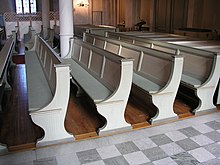pew
See also: Pew
English

Pronunciation
- Lua error in Module:parameters at line 360: Parameter 1 should be a valid language or etymology language code; the value "US" is not valid. See WT:LOL and WT:LOL/E. IPA(key): /pjuː/
- Rhymes: -uː
- Homophone: Pugh
Etymology 1
From Middle English pewe, borrowed from Middle French puie (“balustrade”), from Latin podia, plural of podium (“parapet, podium”), from Ancient Greek πόδιον (pódion, “little foot”), from πούς (poús, “foot”). Doublet of podium.
Noun
pew (plural pews)
- One of the long benches in a church, seating several persons, usually fixed to the floor and facing the chancel.
- In many churches some pews are reserved for either clerical or liturgical officials such as canons, or for prominent families.
- An enclosed compartment in a church which provides seating for a group of people, often a prominent family.
- 2006 September 11, Sheryl Gay Stolberg, "Bush Mourns 9/11 at Ground Zero as N.Y. Remembers", The New York Times [1]
- At St. Patrick’s Cathedral, firefighters in dress blues and white gloves escorted families to the pews for a memorial service, led by Mr. Bloomberg, to honor the 343 Fire Department employees killed on 9/11.
- 2006 September 11, Sheryl Gay Stolberg, "Bush Mourns 9/11 at Ground Zero as N.Y. Remembers", The New York Times [1]
- Any structure shaped like a church pew, such as a stall, formerly used by money lenders, etc.; a box in a theatre; or a pen or sheepfold.
- (Can we find and add a quotation of Samuel Pepys to this entry?)
- (Can we find and add a quotation of Milton to this entry?)
- (colloquial, humorous) A chair; a seat.
- Pull up a pew.
- 1956, Anthony Burgess, Time for a Tiger (The Malayan Trilogy), published 1972, page 38:
- Victor Crabbe's headmaster was a little man called Boothby [...] who subscribed to a popular book club and had many long-playing records, who invited people to curry tiffin and said, "Take a pew."
Derived terms
Translations
long bench in a church
|
enclosed compartment in a church
|
Verb
pew (third-person singular simple present pews, present participle pewing, simple past and past participle pewed)
- To furnish with pews.
- (Can we find and add a quotation of Ash to this entry?)
Etymology 2
Possibly from French putois (“skunk”) or puer (“to stink”) or a clipping of putrid.
Alternative forms
Interjection
pew
- An expression of disgust in response to an unpleasant odor.
Translations
expression of disgust in response to an unpleasant odor
Etymology 3
Interjection
pew
References
- Webster's Seventh New Collegiate Dictionary, Springfield, Massachusetts, G.&C. Merriam Co., 1967
Anagrams
Categories:
- English 1-syllable words
- English terms with IPA pronunciation
- Rhymes:English/uː
- English terms with homophones
- English terms inherited from Middle English
- English terms derived from Middle English
- English terms borrowed from Middle French
- English terms derived from Middle French
- English terms derived from Latin
- English terms derived from Ancient Greek
- English doublets
- English lemmas
- English nouns
- English countable nouns
- English terms with usage examples
- Requests for quotations/Samuel Pepys
- Requests for quotations/Milton
- English colloquialisms
- English humorous terms
- English terms with quotations
- English verbs
- Requests for quotations/Ash
- English terms derived from French
- English clippings
- English interjections
- English onomatopoeias